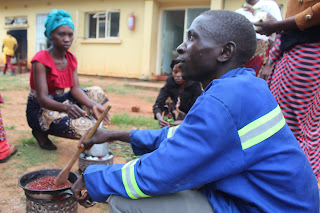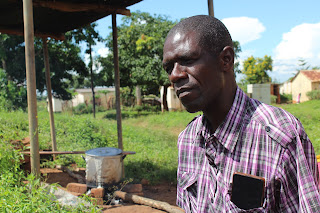 |
Cooking demonstrations are helping farmers better understand how to prepare and preserve their produce |
Zambia has been confronting issues of nutrition predominantly through its Ministry of Health. The 2018 Zambia Demographic Health Survey reveals that the country’s prevalence rate of stunting is 35%.
Though this is down from 40% recorded in 2014, Zambia is still below the Malabo Declaration commitment to improve the continent’s nutrition status which includes every African country bringing down stunting to 10%.The year of nutrition is guided by the theme Strengthening
Resilience in Nutrition and Food Security on the African Continent:
Strengthening Agro-Food Systems, Health and Social Protection Systems for the
Acceleration of Human, Social and Economic Capital Development
In response to this, Zambia has adopted a multi sectorial approach toward improving its nutrition status. In strengthening resilience in nutrition and food security, the country is mainstreaming nutrition into a number of activities conducted by its various line ministries in government.
On the one hand, the Zambian government has been aggressive
in promoting agriculture diversification as a key avenue towards strengthening
agro-food systems and in the process, has targeted women and youth as key participants
in the interventions.
Through its multisectoral approach, key line Ministries are
collaborating in sensitizing and training communities most affected by poor
nutrition. These key line ministries include: the Ministry of Health, the Ministry
of Education, the Ministry of Community Development and; the Ministry of
Fisheries and Livestock alongside its sister the Ministry of Agriculture.
Smallholder farmers contribute significantly to Zambia’s
food basket but unfortunately are among the worst affected by poor nutrition.
Through the Enhanced Smallholder Livestock Investment
Programme (E-SLIP), the Ministry of Fisheries and Livestock, has been working
towards improving the household food nutrition security and improving the
incomes of rural farming households.
E-SLIP - which is co-financed by the International
Agriculture Fund for Development (IFAD), the OPEC Fund for International
Development and the Government of the Republic of Zambia - has facilitated a
series of nutrition trainings to educate smallholder farmers on the nutritive
value of foods that they grow locally and how they can prepare and preserve
them in order to derive the maximum benefit from them in their daily diets.
In Chibombo district of Central province, a training was
held in which the lead trainers comprised of officers from the Ministries of:
Health, Agriculture and; Fisheries and Livestock respectively.
Ireen Musepelo – a Nutrition Technologist under the Ministry
of Health – was the lead trainer. She observed that most smallholder farmers
have been concentrating on the growing of cash crops at the expense of their
household nutrition.
“We want them to concentrate on food production and other
income generating activities [because] we can’t get everything from agriculture
so they’ll need money to buy such foods. We want to empower them with knowledge
and see a change in their food nutrition habits,” Ireen said
 |
| Henry participating in a cooking demonstration |
“I have learned that nutrition for children starts with the
nutrition of its mother when she is pregnant…I have also learned that nutrition
affect my children’s intellectual health apart from their physical growth,”
Henry said.
Another participant - Royd Kasheta - from Kapopo village said that nutrition trainings would help counter cultural practices that have enhanced poor nutrition.
“Most of us used to allow a child to eat until they say
they’re satisfied and we thought that was alright…but now I have learned that
food must be nutritious for the child too,”
 |
| Royd Kasheta, 40, is smallholder livestock farmer |
E-SLIP’s Forage Development Specialist, Bwalya Nkole, explained that the first series of nutrition trainings targeted 250 farmers who have been supported by E-SLIP around the country.
“The objective of the trainings is to promote the production
and consumption of nutritious foods and diversified food [and] the Programme
intends on mainstreaming nutrition related activities in all the interventions
that are being implemented,” Ms Nkole said.
Under the forage and forage seed sub-component of E-SLIP,
farmers are being trained on the production, utilization and preservation of
leguminous forage to enhance livestock nutrition.
These are the same farmers that the Programme has supported
with forage and pasture seed and livestock management trainings in an effort to
promote animal nutrition. Within these and other interventions, E-SLIP will
promote more human nutrition activities.
With such a
multisectoral approach rooted in agriculture, Zambia is gradually arrive at
meeting the Malabo Declaration.




No comments:
Post a Comment